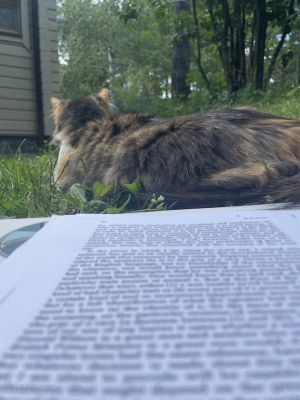
Finding Your Course Syllabi at Dartmouth
I'm spending this summer—the summer between my first and sophomore year at Dartmouth—back at home. The past two terms at Dartmouth, I was debating a lot whether to find some opportunity in the US and stay for the summer or go back home. In the end, my sister made the decision for me.
This, by the way, is my sister:

She was born two days after I landed in Bulgaria, and for a while it wasn't clear if she'll actually wait for me to finish final exams and get back home. She waited. And now I'm spending one summer with my family and my baby sister because my sophomore summer–and every summer to come, probably—is likely to be much busier than this one.
Apart from changing diapers, I'm also trying to get a headstart in some of the classes I'll be taking next term. In Fall 24, I'll be taking Physics 3, a prerequisite for the Neuroscience major, Computer Science 10, a prerequisite for the Computer Science major, and PSYC 40 Computational Neuroscience, an elective course that will count toward my neuroscience major.
To prepare, I found online old syllabi of the courses (I actually haven't looked up anything about the physics course), and I'm now just going through the material (students don't really need to do this—most professors will post your course syllabus on your course page at the start of the term. I'm just checking them early because... why not?). And the reason I'm sharing this with you is because I like to prepare for my future courses by finding old syllabi online, so a prospective student like you can learn what it's like to take a given Dartmouth course, by finding its syllabus online.

COSC 10 (Object Oriented Programming) has, in fact, a whole website dedicated to the course. Here's the syllabus from Winter 24, when professor Tim Pearson taught the class. You can see the class schedule and linked in it, the lecture notes, plus all the needed software. Old syllabi are also very useful when choosing what classes to take.
The old syllabus I found for PSYC 40, Computational Neuroscience, is a bit less fancy than the COSC 10 one. There isn't a whole website–just a PDF file–but it's a file you can find as easily as I did if you just google "Computational Neuroscience Dartmouth syllabus."
Now, you won't be able to access ALL courses' syllabi; some syllabi are accessible only to people in the Dartmouth community. But you can definitely find open syllabi, like the CS and neuroscience ones I showed you, that will allow you to get a feel of what a normal 10-week term at Dartmouth might look like.


















